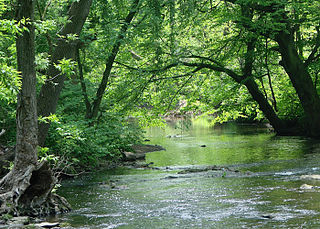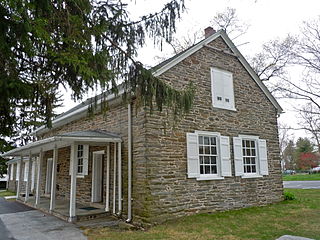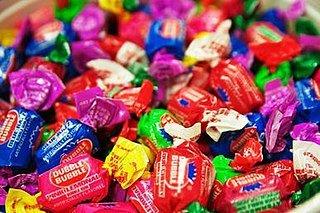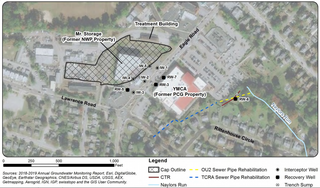The Lancaster Caramel Company of Lancaster, Pennsylvania, was founded by Milton S. Hershey in 1886. It was Hershey's first successful candy company and helped him build a reputation.

Haverford Township is a home rule municipality township in Delaware County, Pennsylvania, United States. Haverford is named after the town of Haverfordwest in Wales, United Kingdom. It is a commuting suburb located due west of Philadelphia and is officially known as the Township of Haverford. Despite being under a home rule charter since 1977, it continues to operate under a Board of Commissioners divided into wards, as do "First Class" townships that are still under the Pennsylvania Township Code. Haverford Township was founded in 1682 and incorporated in 1911.

Chewing gum is a soft, cohesive substance designed to be chewed without being swallowed. Modern chewing gum is composed of gum base, sweeteners, softeners/plasticizers, flavors, colors, and, typically, a hard or powdered polyol coating. Its texture is reminiscent of rubber because of the physical-chemical properties of its polymer, plasticizer, and resin components, which contribute to its elastic-plastic, sticky, chewy characteristics.

The Topps Company, Inc. is an American company that manufactures trading cards and other collectibles. Formerly based in New York City, Topps is best known as a leading producer of baseball and other sports and non-sports themed trading cards. Topps also produces cards under the brand names Allen & Ginter and Bowman.

The Fleer Corporation, founded by Frank H. Fleer in 1885, was the first company to successfully manufacture bubble gum; it remained a family-owned enterprise until 1989.

The Wm. Wrigley Jr. Company, known as the Wrigley Company, is an American multinational candy and chewing gum company, based in the Global Innovation Center (GIC) in Goose Island, Chicago, Illinois.
The Nashua Corporation was an American company headquartered in Nashua, New Hampshire that made labels, specialty papers, and imaging products and services. On September 15, 2009, it was bought by Cenveo, Inc. As of early 2010, it had four factories in several states. In April 2019 the long-run label and receipt paper businesses were sold by Cenveo to Iconex.

Havertown is a residential suburban unincorporated community in Haverford Township, Pennsylvania, United States. It is located approximately 9 miles west of the center of Philadelphia. Havertown's ZIP Code is 19083 and "Havertown" is a postal address. The name "Havertown" was coined by the U.S. Post Office and came into use on January 1, 1946. Before then, each constituent community was known by its local name: Bon Air, Brookline, Penfield, Beechwood, Llanerch, Manoa, Oakmont, Coopertown, and Ardmore. Under William Penn's land divisions these communities were part of the Welsh Tract and comprised the area known as Harford, a Welsh contraction of Haverford.

Dubble Bubble is an American brand of fruit-flavored, usually pink-colored, bubble gum invented by Walter Diemer, an accountant at Philadelphia-based Fleer Chewing Gum Company in 1928. One of Diemer's hobbies was concocting recipes for chewing gum based on the original Fleer ingredients. Though founder Frank H. Fleer had come up with his own bubble gum recipe under the name Blibber-Blubber in 1906, it was shelved due to its being too sticky and breaking apart too easily. It would be another 20 years until Diemer would use the original idea as inspiration for his invention.
Walter E. Diemer was an American accountant who, in 1928, invented bubble gum.

Tootsie Roll Industries is an American manufacturer of confectionery based in Chicago, Illinois. Its best-known products include the namesake Tootsie Rolls and Tootsie Pops. Tootsie Roll Industries currently markets its brands internationally in Canada, Mexico, and over 75 other countries.

The O-Pee-Chee Company, Ltd. was a Canadian confectionery company founded in 1911 that produced candy until the mid-1990s. Based in London, Ontario, the company produced its first trading card sets in the 1930s, releasing several collections of baseball, gridiron football and ice hockey cards until the company was sold to Nestlé in 1996.
The Bowman Gum Company was a Philadelphia-based manufacturer of bubble gum and trading cards. It was founded by Jacob Warren Bowman in 1927.

Leaf International BV was a confectionery company founded in the 1940s. Leaf had sales of approximately €527m (2010) and 2,400 employees. It had 11 factories in seven countries. Leaf was owned by CVC Capital Partners, Nordic Capital, and management. Bengt Baron was the CEO of Leaf.
Freshen Up was a chewing gum with flavored gels inside manufactured by Cadbury Adams in Brazil. Current flavours include cinnamon, peppermint, spearmint and bubble gum. A fruit variation was offered in the 1970s.
Cry Baby is an American brand of sour bubble gum manufactured by Tootsie Roll Industries.The product was originally named by David Klein who invented the Jelly Belly jelly beans.
Two multi-national companies, Wrigley and Cadbury, together account for some 60% market share of the worldwide chewing gum market. The global market shares for the top five chewing gum companies are estimated to be:

Havertown Superfund is a 13-acre polluted groundwater site in Havertown, Pennsylvania contaminated by the dumping of industrial waste by National Wood Preservers from 1947 to 1991. The state first became aware of the pollution in 1962 and initiated legal action against the owners in 1973 to force them to cleanup the site. The Environmental Protection Agency (EPA) ranked the site the eighth worst cleanup project in the United States. The site was added to the National Priorities List in 1983 and designated as a Superfund cleanup site in the early 1990s. Remediation and monitoring efforts are ongoing and the EPA transferred control of the site to the Pennsylvania Department of Environmental Protection in 2013.
Prizes are promotional items—small toys, games, trading cards, collectables, and other small items of nominal value—found in packages of brand-name retail products that are included in the price of the product with the intent to boost sales, similar to toys in kid's meals. Collectable prizes produced in series are used extensively—as a loyalty marketing program—in food, drink, and other retail products to increase sales through repeat purchases from collectors. Prizes have been distributed through bread, candy, cereal, cheese, chips, crackers, laundry detergent, margarine, popcorn, and soft drinks. The types of prizes have included comics, fortunes, jokes, key rings, magic tricks, models, pin-back buttons, plastic mini-spoons, puzzles, riddles, stickers, temporary tattoos, tazos, trade cards, trading cards, and small toys. Prizes are sometimes referred to as "in-pack" premiums, although historically the word "premium" has been used to denote an item that is not packaged with the product and requires a proof of purchase and/or a small additional payment to cover shipping and/or handling charges.












